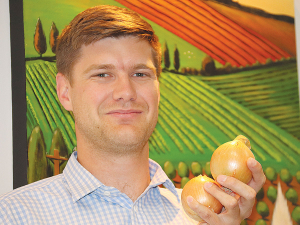Hort exporters eye Indian market
Exporters need to understand that India should not be seen as just one country to export to, rather a country of many unique states and regions.
 Onions NZ chief executive James Kuperus says 40% of NZ onions exports are destined for Europe, returning $65m a year.
Onions NZ chief executive James Kuperus says 40% of NZ onions exports are destined for Europe, returning $65m a year.
Onion growers will be saving $6.5 million on tariffs once the free trade agreement (FTA) with its number one market – the European Union – is ratified next year.
Last month, 524 of the 705 member European Parliament voted in favour to approve the agreement. The FTA will come into force once ratified by the incoming New Zealand Government. This is expected around the middle of next year.
Onions NZ chief executive James Kuperus told Hort News that 40% of NZ onions exports are destined for Europe. This is approximately 70,000 tonnes a year, returning $65m to rural New Zealand.
“This FTA puts us on a level playing field with some of our competitors such as Chile and in a more favourable position than countries such as Australia,” he says. “The FTA will save the industry about $6.5m a year which is significant for our sector.”
The EU FTA is good news for the sector, given the extremely difficult season onion producers have had in the North Island.
Kuperus says, overall, the sector has been bruised by the last few years with extreme weather and the Covid pandemic.
“However, the future is looking promising if we can improve market access to markets such as the EU and China,” he adds.
While NZ onion growers don’t have market access to China, the sector is working on establishing trade in that country. Recently, Onions NZ led a delegation to China for the CIIE fair. Kuperus says the delegation included onion exporters and they met with importers, retailers and NZ Government officials.
“We currently do not have phytosanitary (biosecurity) market access to China. But we’re looking to establish two way trade with China, after China gained market access to New Zealand in 2017,” he explains.
“We believe within five to 10 years after market access is achieved, China will be one of our largest markets. We’re very fortunate to be well represented in China by New Zealand officials who are working hard to improve market access for horticulture crops.”
Sector Bouncing Back
In the year to March 2023, the New Zealand onion industry exported $143 million worth of onions to 45 countries and employed 1,050 people.
Kuperus says onions are an important part of many vegetable growers’ rotations in New Zealand. He adds that improving market access will lead to better outcomes for onion growers and the wider sector.
“We are fortunate to have hard working Government officials that continued to advocate for free trade agreements and market access during the Covid pandemic.
“We are starting to see the results of this hard work now and owe these people a lot for their work in countries which at times had a lot stricter lockdowns than New Zealand.”
Commenting on this year’s onion crop, Kuperus told Hort News the sector has recovered from the recent weather woes and plantings have been completed.
“The area planted is back to normal. Currently the crop is looking good, however there is a long way to go,” he says.
“Last year was an extreme year and we are hoping we don’t see a season like that again. In the Hawke’s Bay alone, we lost 40% of the crop to Cyclone Gabrielle.”
Former Fonterra executive Alex Turnbull has been appointed CEO to lead all five Yili Oceania Business Division companies in New Zealand.
Fonterra executive René Dedoncker is leaving the co-operative later this year to lead Australian agribusiness Elders.
Alliance Group and the Southland Stags rugby team have joined forces in a partnership that will see the the meat co-operative's farmgate brand feature on players' team kits and replica jerseys.
Fonterra's plan to expand its organic programme to the South Island is being well received by farmers, the co-op says.
Voting has started for the renewal of DairyNZ's milksolids levy.
The most successful catchment groups in NZ are those that have 'a source to sea' approach.

OPINION: Here w go: the election date is set for November 7 and the politicians are out of the gate…
OPINION: ECan data was released a few days ago showing Canterbury farmers have made “giant strides on environmental performance”.